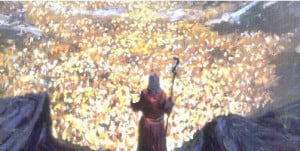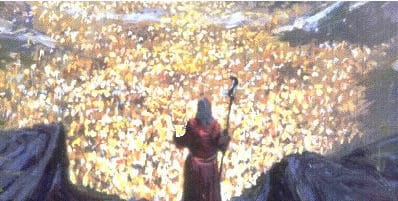 Nitzavim-Vayelech (Deut. 29:9–31:30) — The Torah portion of teshuva, returning to one’s core. The portion gives directions and tools for both the private and the national spiritual return.
Nitzavim-Vayelech (Deut. 29:9–31:30) — The Torah portion of teshuva, returning to one’s core. The portion gives directions and tools for both the private and the national spiritual return.
The Shorashim Torah Study and Overview Guide
The Parshah of Nitzavim, which comes before Rosh Hashana, prepares the people for individual and national repentance. The code word HaYom is used: “You stand upright this day (HaYom), all of you, before HaShem your G-d.”
1) Where else in scripture is the code word HaYom used?
Moshe then gives the ingredients for both individual and national repentance: unity, belief in the possibility of change, and free choice
2) Which verses highlight those ingredients?
Moshe warns or actually prophecies of the exile and desolation of the Land that will result if and when Israel abandons G-d’s laws. He describes how men of foreign tongues will come to testify regarding the desolation
3) Was that an example of G-d adding salt unto the wounds or something more impactful?
Then Moshe prophesies that in the end, “You will return to the L-rd your G-d . . . If your outcasts shall be at the ends of the heavens, from there will the L-rd your G-d gather you . . . and bring you into the Land which your fathers have possessed.”
4) If that is true and the exile was also foreseen , then what was the purpose of it all ad how would all that history be a witness s to the world?
Moshe declares that HaShem says, “Life and death I have set before you, blessing and curse. And you shall choose life.”
5) Why would anyone choose a curse?
In the next portion of Vayelech (“And He Went”) we begin to read of the events of Moses’ last day of mortal life. Moshe says “I am one hundred and twenty years old today,” he says to the people, “and I can no longer go forth and come in.”
6) Why does it begin with the words “And He Went”? Where was he going? Wasn’t he already speaking to them?
Moshe then transfers the leadership to Joshua, and concludes the writing of the Torah which he puts in safekeeping in the Ark of the Covenant.
It is at this point that the powerful ceremony of hak’hel (“gather”) is given: every seven years, during the festival of Sukkot of the first year of the shemittah cycle, the entire people of Israel—men, women and children—should gather at the Holy Temple in Jerusalem, where the king should read to them from the Torah.
7) Why is Moshe declaring this now?
Listen to this week’s podcast:
